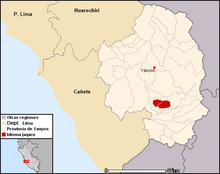Jaqaru language
| Jaqaru | |
|---|---|
| Haq'aru | |
| Native to | Peru |
| Ethnicity | 2,000 Jaqaru and Kawki (2000) |
|
Native speakers
|
740 (2004) |
|
Aymaran
|
|
| Dialects |
|
| Language codes | |
| ISO 639-3 | |
| Glottolog | jaqa1244 |

Distribution of Jaqaru (red)
|
|
Jaqaru (Haq'aru) is a language of the Aymaran family. It is also known as Jaqi and Aru. It is spoken in the districts of Tupe and Catahuasi in Yauyos Province, Lima Region, Peru. Most of the 2000 ethnic Jaqaru have migrated to Lima.
Kawki, a divergent dialect, is spoken in the nearby communities of Cachuy, Canchán, Caipán and Chavín by a few elderly individuals (9 surviving in early 2005). Hardman has noted that while Jaqaru and Kawki share a degree of mutual intelligibility, speakers of one were unable to understand tape recordings of the other, and in a few cases of marriage between Kawki and Jaqaru speakers, the home language was Spanish. (However, the home language of most Jaqaru and Kawki is now Spanish.) Historical analysis shows that the two languages were out of contact for a period.
There exist clear differences between Jaqaru and Kawki in regard to morphology. Jaqaru has ten verb persons, whereas Kawki has only nine (due to a case of homophony wherein Kawki maintained the semantic distinction between two different person markers, but lost the form distinction between the two). Additionally, regressive vowel harmony is present throughout the verb person system in Jaqaru, but does not appear in Kawki. Phonologically, Kawki is differentiated from Jaqaru in its vowel system. Jaqaru contains six vowels- three of regular length and three short, whereas Kawki has only the three regular-length vowels.
Jaqaru has three phonemic vowels /a i u/, which distinguish two degrees of length. Long vowels are indicated in writing as follows: /a: i: u:/.
Syntax in Jaqaru consists mainly of a system of sentence suffixes. These suffixes indicate sentence type (interrogative, declarative, etc.) Suffixes can and often do occur more than one per sentence, marking sentence type and creating complex constructions. Simply put, for sentences to be grammatical in Jaqaru, they must be inflected. Morphological words and syntactic phrases which do not contain a sentence suffix are judged by native speakers to be ungrammatical and for some, impossible to say (Hardman, 2000).
Sentence suffixes occur after all other morphological processes and can occur on any morphological words or syntactic phrases. The nature of sentence suffixes allows for freedom of word order and creativity in sentence construction, useful to storytellers (Hardman, 2000).
...
Wikipedia
